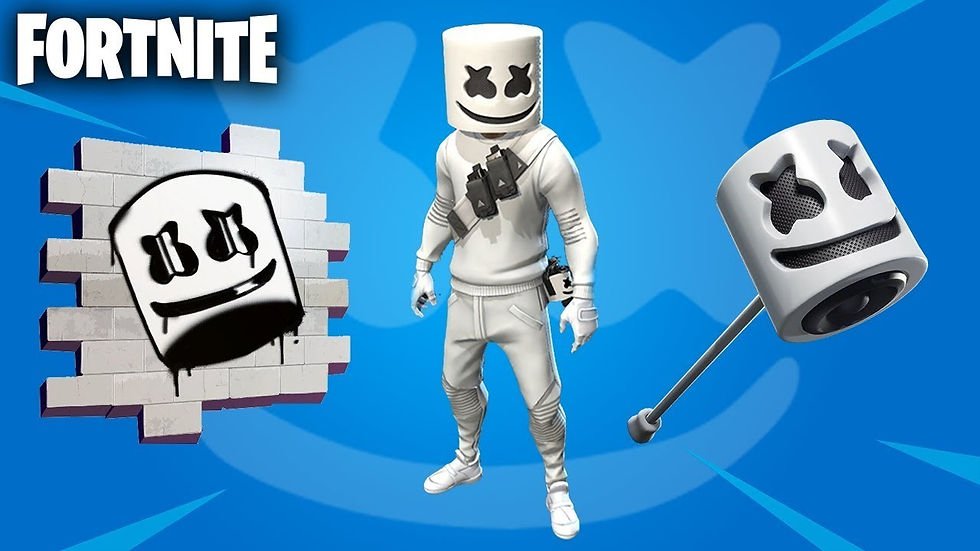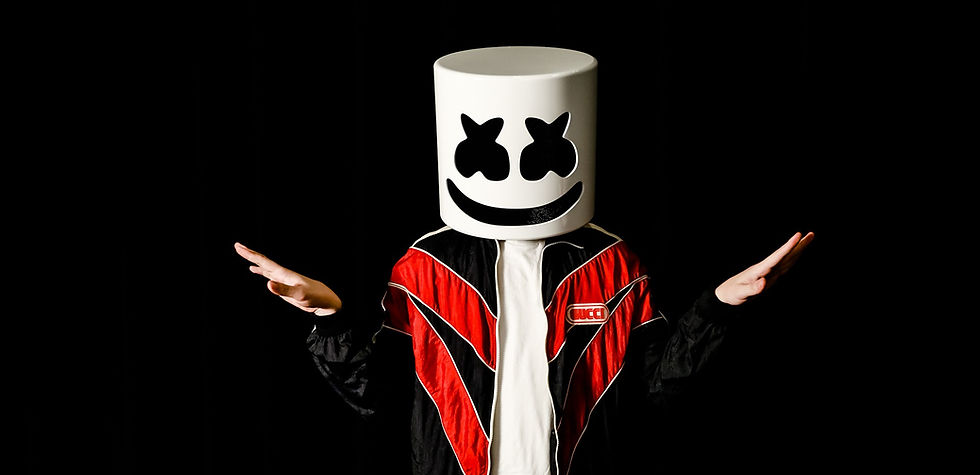HOW IDENTITY DESIGN & CONTENT STRATEGY MADE MARSHMELLO FAMOUS
- Jason Randle

- Jul 18, 2021
- 5 min read
Updated: Feb 4, 2022
Why Does Brand Strategy Matter for Musicians? Part Two in a Two Part Case Study examining the role of Brand Strategy in the role of pop-electronic music sensation, Marshmello.

In Part One, we explored the meteoric success of popular EDM artist Marshmello, delved into one of the major factors of his overall brand strategy- the licensing of his likeness to Epic Games massively popular online Battle Royale game- Fortnite.

While this was arguably the biggest contributor to the overall success of the artist, all pre-existing industry connections aside, it wouldn't be possible without first having defined the brand itself, leading to the level of popularity necessary to secure a brand deal of that magnitude. This begs the question, then;
What is branding?
Well, concisely defined, branding is the sum total of the impressions your product or service leaves in the mind of your prospect, particularly in relation to that of any existing competitors.
Cool story bro, how does this relate to music again?
Branding Goes Beyond a Logo
Let's get back to our example; Chris Comstock was already a pretty successful as a trap producer under his former alias, Dotcom, so why rebrand? We aren't here to do a takedown on the old branding, so suffice to say it had nowhere near the unique appeal or outright marketability of the next iteration of his artistry.

Taking a cue from Deadmau5, in order to take things to the next level Comstock puts on a helmet and rebrands to Marshmello, carefully guarding the knowledge of his true identity. It's here that the genius of the brand strategy truly begins.
With the unannounced flip from "white guy doing trap music" - a position currently saturated with the likes of Diplo, Skrillex, Calvin Harris, and so many, many more- to mysterious cartoon helmet character collaborating with hot major label artists, making commercially viable genre-spanning EDM, a well executed Brand Identity has led to Marshmello becoming the worlds highest paid DJ in 2020.

From Vanilla Bland to Sweet Brand
Becoming the extremely marketable character has many additional advantages for the new brand.
Mass market appeal, specifically with younger generations, well targeted at the coveted 18-24 demographic, but with a fanbase skewing far younger. Anecdotally, my 6 year old nephew is OBSESSED with Marshmello, which he discovered while watching another kid play Fortnite on YouTube!
The helmet itself is designed such that it becomes iconic, providing a strong visual anchor to the brand identity.
New brand allows for further sonic exploration and collaboration with artists outside the EDM market, broadening the potential fanbase.
The nature of the character lends itself to cross-branding opportunities, as we touched on in Part One, more on that later.
The mystery of who was in the helmet created several years of news-worthy hype among speculators, manufacturing demand through savvy PR and marketing. Furthermore, should the project not be well-received, it would allow the artist to distance themself from the project without carrying forward a stigma in their career.
Perhaps most importantly, given the helmet conceals it's wearer's identity, it allows for flexibility in scheduling artist performances, the potential for sick days while adhering to "the show must go on," and the possibility for the character's creator to exit the role without killing the brand- typically unheard of with bands. Plus, ethics aside, the ability to double- triple- or quadruple- book an artist who's live performance consists of a light show and playing pre-produced music, in multiple cities/venues is a tempting possibility for any tour manager,
However, putting a helmet on and a name change alone do not make a rebrand. The helmet is merely a gimmick that the brand strategy can be anchored around. Think of it as a cornerstone in the foundation of the brand identity.
Proof the genius of the helmet gimmick in the brand strategy becomes apparent in subsequent PR appearances, spoofing an appearance only to be "revealed" as Tiesto at EDC in 2016, with subsequent reveals from Will Farrell, and other famous friends contributing to the mystery and excitement leading up to the final reveal by Forbes in 2018. All the while the helmet becomes more and more iconic, further cementing the brand into the public zeitgeist.

The Messaging's in The Merchandise...
Great, the hype generated by the mystery is driving exposure, and the helmet has become something of a "household name." Time to capitalize on some additional streams of revenue. All touring artists are aware of the revenue bump a merch booth can offer. When a brand has a strong logo the possibilities to apply the logo on various forms of merchandise broaden exponentially. A quick web search will turn up literally thousands of related items to Marshmello. Beyond the traditional apparel, the brand has been applied to everything from keychains, to vinyl figurines, and even officially licensed helmets ranging from inexpensive halloween costumes, and more. Now obviously, he's probably not getting a piece of ALL of this, as much of it is unlicensed. Why would the team let their profits be infringed on like that?
Think of it as the cost of marketing instead. He can allow for a certain amount of bootlegging/fan art/etc. to be out there because of the brand loyalty it's building in his audience. When fans can buy and wear the helmet and sort of "become" their favorite artist for a moment, think about how staunch of a fanbase that has helped him build. In a quote released from the artist, you can see how the brand messaging aligns; “The helmet makes me Marshmello and also makes you Marshmello…we are all Marshmello.”
Part of the helmet gimmick is obviously the mystery it creates for who's underneath. In another stroke of genius the messaging directly from the artist gives insight on how it can be incorporated in brand strategy. In one statement the artist claimed “I don’t take my helmet off because I don’t want or need fame. I’m genuinely trying to create something positive for people to connect with.” Here he can slip any proverbial punches thrown at him about "selling-out" his former "underground" alias, all while achieving massive commercial success, collaborating with major mainstream artists, and living an incredible lifestyle.
Sounds like a plan, or dare I say- a strategy.

Ready to get started working with pros who have done it before and have proven, repeatable results?
Drop your info in our Contact Form and we'll get in touch to schedule a call and learn if we're a good fit to work together.
Still need more examples we've got the chops? Check out our Case Studies to see other artists we've helped, or read thru our blog for some additional breakdowns of strategies we've examined from afar and dissected for what made them successful.

If you enjoyed this, but missed Part One, be sure to check it out for a look into how content marketing made Marshmello the World's Richest DJ in 2020. See you there!
-Jason
Socials:
IG



Comments